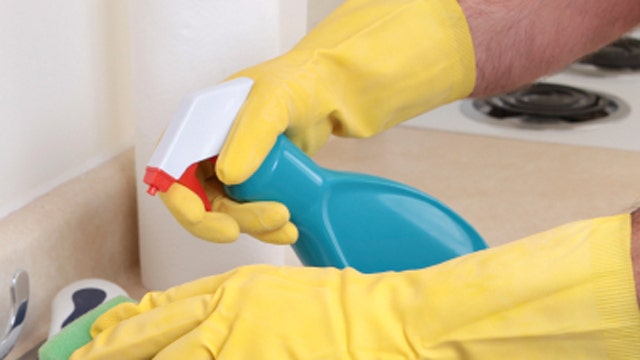Get the latest news on coronavirus and more delivered daily to your inbox. Sign up here.
As many Americans attempt to combat the coronavirus pandemic through vigilant cleaning and sanitizing in the home, public health experts warn that the increased use of these products may pose a risk equally as deadly — especially to kids.
Emergency poison-control calls related to household cleaning products and disinfectants were up 20.4 percent between January and March this year, compared to 2019, according to an April 24 report by the Centers for Disease Control and Prevention.
CLICK HERE FOR COMPLETE CORONAVIRUS COVERAGE
Experts say the obsession with cleanliness may also be leading to carelessness when it comes to using these products with children inside the home.
Aggressive cleaning calls for careful consideration, says Samara Geller, a senior research and database analyst from the Environmental Working Group.
“As many people hunker down indoors to flatten the curve of the coronavirus epidemic, they may be using disinfectants and other cleaning products more frequently,” she tells The Post. “It’s more important than ever that consumers use these chemicals safely, making sure to follow label directions exactly.”
Following the instructions is especially important now since products such as those containing ammonia or bleach “can cause or exacerbate respiratory issues,” Geller says.
Reports involving kids ages 5 and under accounted for 35.7 percent of all calls to poison control centers from January to March 2020, with 46.9 percent of those calls involving disinfectants. On the other hand, those ages 6 to 19 made up 8.9 percent of exposures to cleaning products and 13.6 percent of exposures to disinfectants.
“Any of the currently available products can be hazardous to children,” saysDr. Kelly Johnson-Arbor, National Capital Poison Center’s medical director.
CORONAVIRUS DOESN'T STOP FRENCH DOCTOR, 98, FROM HELPING PATIENTS
“Disinfectants generally have similar compositions,” she tells CNN. “They’re generally made up of bleaches, ammonium compounds, alcohols, abrasive agents — all of those things are potentially toxic.”
Gellar is particularly concerned with the overzealous use of bleach around the home, particularly when mixed with other cleaning solutions.
“Sodium hypochlorite, the active ingredient in chlorine bleach, should never be mixed with acids or other cleaners — it can be fatal,” Johnson-Arbor warns.
The EWG’s list of approved cleaning products for cleaning COVID-19 can be found on their website. It includes Seventh Generation Disinfectant Spray, Purell Multi-Surface Disinfectant and Lysol With Hydrogen Peroxide Multi-Purpose Cleaner — none of which, by the way, are safe for ingestion.
Johnson-Arbor adds caution for so-called “natural” cleaning products, which can be just as dangerous as conventional cleaners.
“Natural cleaning products may not contain the ‘harsh chemicals’ that are present in the traditional products, but they might contain other things,” she says, such as essential oils, which “can be very irritating to the skin, to the eyes and to the gastrointestinal tract.”
New statistics released by the Health Resources and Services Administration echoed the CDC, adding U.S. poison control centers had seen a 24 percent increase in calls regarding any kind of toxin during the first three months of 2020, just as the coronavirus was making its way around the globe.
Some regions have experienced an even greater surge — by more than 100 percent since March 31 at the National Capital Poison Center, for example, which serves counties in Maryland, Virginia and the District of Columbia.
NYC TEACHER DIES OF CORONAVIRUS AFTER BEING TURNED AWAY FOR TESTING
Notably, the overall trend began prior to President Trump’s comments regarding the use of household cleaners to cure the coronavirus, in an April 23 press briefing, which he later said was sarcasm. On the same day, the Department of Health and Human Services announced they would give nearly $5 million to help fund poison control centers across the US.
“We are open 24 hours a day, every day of the year, including holidays,” Johnson-Arbor says. Toll-free hotlines for poison control centers across the US can be found through Poison.org.









































